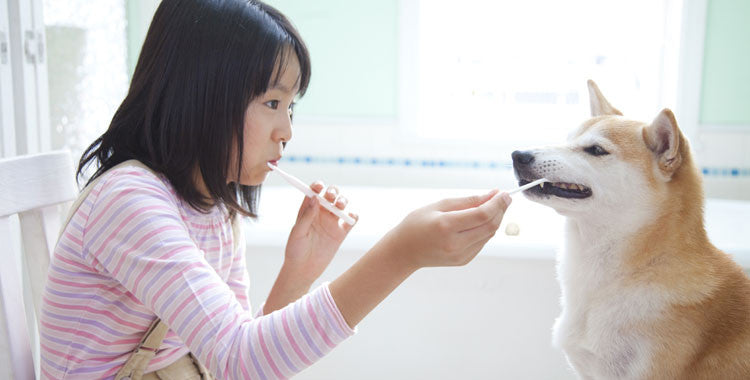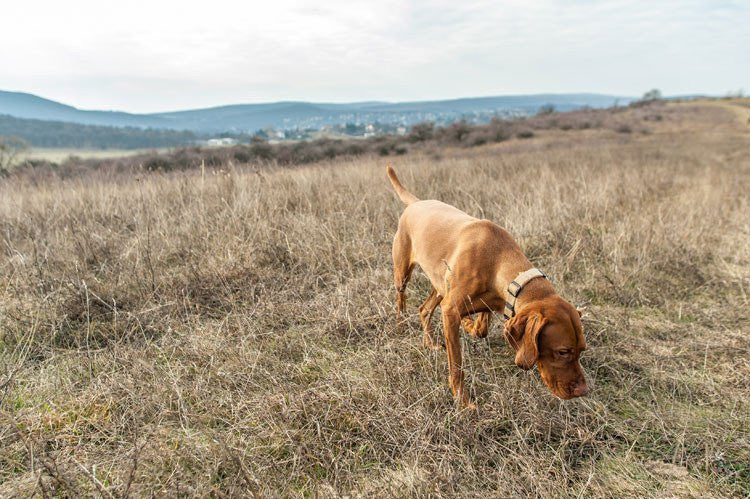
Brushing teeth: how to do it with your pet?
We recently learned from the American Veterinary Medicine Association (AVMA) that only 2% of dog owners brush their pets' teeth. With this in mind, it's no surprise that 65% of dogs with stage 1 periodontal disease go untreated.
If brushing your teeth isn't on the agenda for you, then this statistic probably makes a lot of sense!
At first, every time we wanted to brush Weston's teeth, it was a huge chore. At one point, we almost gave up. Almost.
But since we work in the pet health industry after all, we know too much to let plaque build up on the teeth of every member of our family. Poor dental hygiene can lead to bad breath. This can shorten your pet's life expectancy! And we can all agree that our pets never live long enough, right?
Avoiding brushing your teeth is simply not a viable solution.
-
RELATED ARTICLE: 👉 Gingivitis in an animal
Why brush your pet's teeth?
No matter how much we argue, we would never let a child go months without brushing their teeth because we know the consequences. Well, the consequences are the same for our pets.
Even if you feed your pet the best food, plaque builds up on their teeth over time. Bits of food get stuck in certain areas, and bacteria eat away at the tooth. This causes cavities. Ever had a cavity? When these cavities get bad, they can become infected and very, very painful!
Animals instinctively hide pain because in the wild, pain means weakness. It's a survival instinct.
Now imagine your pet is suffering from the worst possible dental pain, and they're trying to act like everything's fine. I don't want that to happen to Weston, and I'm guessing you don't want that to happen to your pet either.
-
LEARN MORE ABOUT: 👉 What to do when your pet has inflammation?
Unfortunately, we can't explain these things to our pets. We can't make them understand that brushing their teeth today can prevent them from suffering later. This is beyond their comprehension. So we have to find other ways to get our pets to enjoy brushing their teeth.
We struggled with our dog for months before finally finding a few solutions that seemed to work. I understand that what works for our dog may not work for your dog or cat, but it's all about trying and seeing what works. Do everything you can to find something that can make brushing your pet's teeth bearable. And who knows? Your pet might even end up loving the time spent with you!
How often should you brush your pet's teeth?
The ideal answer to this question is every day. Plaque can turn into tartar within 36 hours. It's a rapid process. If you can't brush your teeth every day, opt for brushing every two or three days.
It's true that a little is better than nothing, but if you really can't brush your pet's teeth at least once a week, think about whether you have the time to properly care for a pet in general...
3 tips to make your pet love brushing their teeth
1. Start at a young age!
If your pet is still a baby, this tip is extremely important. Start around the time the puppy or kitten has all of its baby teeth. This happens around eight weeks old. The goal of this early exercise isn't to prevent cavities. Not yet.
Your pet will soon lose those baby teeth. At this stage, we want to get them used to having their teeth brushed before they get too old and it becomes more complicated to manage. If your pet is already too old for this, don't worry. It's never too late.
Read on for our top tips for getting ALL pets to enjoy, or at least tolerate, dental brushing. The more you brush their teeth, the more likely your pet will be to tolerate or even enjoy this little ritual.
A few minutes of brushing can prevent costly and painful tooth extractions later in life.
2. Be consistent
Pets, especially dogs, love their routines. When you disrupt a pet's routine, you're likely to see signs of stress. Your pet may start getting into mischief around the house, or protest by barking or meowing. They may even attack your furniture!
You've probably learned this in other areas of training, but this fact applies to tooth brushing as well. If your pet knows what to expect and when to expect it, they'll be more likely to accept it. Set a brushing schedule that you can stick to most of the time.
3. Focus on taste
Pet toothpaste comes in a variety of flavors that your pet might enjoy: poultry, beef, tuna, and more. It's not exactly what will make your pet totally love brushing their teeth, but the taste might help entice your dog or cat.
If part of the experience is enjoyable, it will help your pet associate something positive with the overall experience.
Plan
Another tip to help your pet enjoy the experience is to brush their teeth outside of mealtimes. If you brush their teeth right after a meal, your pet won't be hungry enough to care about the taste of the toothpaste.
If you brush his teeth right before a meal, your pet will be too focused on the taste of the food to allow you to brush his teeth.
The first brushings
Don't expect your dog or cat to be enthusiastic about the toothbrush right away. Instead, the toothbrush will be more of a chew toy for them.
To encourage your dog or cat to enjoy having their teeth brushed, make the toothpaste a treat. First, give it on your finger at your chosen brushing times. After two or three days, introduce the toothbrush.
First, let your pet lick the toothpaste off the toothbrush instead of taking it from your finger. The next day, put the toothpaste in the pet's mouth with the toothbrush.
Your pet should welcome the toothbrush, as they'll be able to smell the delicious toothpaste. It may take a few days to get used to a proper brushing, but it's good!
Other tips for maintaining your pet's dental health
In addition to regular dental brushing, there are other tips to help your dog keep their teeth healthy. You can use the best dental chew toys based on your pet's breed.
For our part, we use the Greenie's ones (which you can substitute with any other toy you use) because they work well and are easy to find.
We also add a spray of the Tartar product to Weston's water to help dissolve the scale buildup.
If you are concerned about your pet's hygiene and dental health, we can also advise you on how to get your pet back to health!






















Leave a comment
This site is protected by hCaptcha and the hCaptcha Privacy Policy and Terms of Service apply.